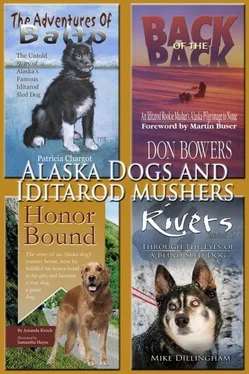As I half-doze, the lodge owner, Gary Gabryszak, is playing the guitar for the checkers and a radio reporter. He does “The Wreck of the Edmund Fitzgerald” and several other standards in a highly polished style. When someone asks him he admits he was a professional musician and worked with many well-known groups in the Lower 48 before he came to Alaska with his family some years ago.
It’s no more surprising than running into John Denver or Jimmy Buffett in Talkeetna, which happened a few years back. As has often been said about Alaska, it may be a big place, but it’s a small world. You never know who you’ll meet out here.
Monday — The Klondike 300: Yentna Station to Skwentna to Yentna Station (75 miles)
I finally zonk out in a small bunk room in the lodge loft, oblivious to a host of aches and hurts and a painfully blistered frostbitten fingertip. After a sound sleep the checker wakes me up at five o’clock. I hope the dogs feel better than I do, but it’s time to get moving. Already I’ve spent 10 hours here, far longer than most of the stops I’ll make on the Iditarod.
It’s only 30 below when I start hooking up at 5:30; first light is still a few hours away. We’re headed up river by six, the dogs running well in the moonless predawn dark on the deserted river. It’s Monday, and the weekend snowmachiners have long since returned to Anchorage; we’ll have the river completely to ourselves.
Despite the lack of moonlight, I have no problem making out the river banks and even the trail itself. Lucky has been up front since we got down onto the Susitna River; having watched him unerringly choose the best trail for hours on end yesterday, I am content to run with my headlight off for the most part and let him lead us as he wishes.
As the light slowly brightens behind us I have to switch dogs around a few times to keep the team lined out and running smoothly. This is part of the ongoing management of any dog team on a long run; sometimes dogs will tire or decide not to pull in a particular position. Conversely, some dogs will run faster than their neighbors — or the dogs in front of them — causing a rash of slack lines. For instance, if the swing dogs are too fast, a front-ender will often as not slow down just like a motorist backing off the gas to force a rude driver to pass.
These anomalies become apparent in the form of drooping tuglines and ganglines and disruptions in the even pace of the team. Fixing them is analogous to a pilot continually fine-tuning an airplane engine, fiddling with the throttle and mixture to suit changing conditions such as temperature and altitude. Sometimes it seems half of the effort of keeping a team going on a long haul is successfully playing an endless head game with the dogs. They are, after all, only flesh and blood, and they get frisky or tired or even bored just like humans. And they can and will simply stop if they don’t feel like running any longer.
The musher’s job is to stay ahead of this malaise. The best way is to keep the front end moving so the rest will follow. Sometimes this gets tricky and too many leaders can even be a bad thing. In practice, running two good leaders together on some trails doesn’t promote peaceful progress. All too often, two strong-minded front-enders won’t agree on where to run when faced with several equally good choices, such as on a river with a 100-foot-wide snowmachine highway.
This can result in one leader yanking everyone over to the side he or she prefers, shortly followed by a jerk in the opposite direction as the other retaliates. It doesn’t help the team’s confidence to weave down the trail like a seasick snake, so one of the clashing canines has to go back in the team to restore harmony.

A team takes a break on the Yentna River. Frequent short stops on boring river runs can help keep the dogs interested.
One option to get around this problem is to go to a single leader, which is what I did yesterday because I had an odd number of dogs in the team after dropping Yankee. Lucky did quite well up front by himself, keeping his own pace and smoothly selecting the best trail from the maze of snowmachine tracks without having to drag a partner to one side or the other. Of course, there are drawbacks: single lead is a lot of work, and a single leader frequently sets a slower pace and tires more quickly than with a helpmate.
Today, though, single lead isn’t an option because I’ve removed one of the gangline sections after dropping Buck; two blank spots isn’t a good idea in most circumstances because it strings everything out too much and makes for more difficult handling on tight trails.
This morning Lucky is going well enough, but co-leader Maybelline seems to have gone a bit sour and isn’t her usual perky self. She’s slowing Lucky enough to allow the ever-eager swing dogs to overrun, causing even more of a slowdown as she turns to glare at the tailgaters behind her. It’s not a matter of a tired team — exactly the opposite. I’ve got to find the combination which keeps the energy flowing in a smooth and usable form. So, I juggle leaders and swing dogs until I get a lineup that works well.
This is why a good roster of “go-dogs” or trail leaders is necessary. These are dogs who will run up front in lead or swing but aren’t always very good on commands. On trails with few distractions or turns they can frequently lead by themselves, but more often they act as accelerators and pacers for the main leaders and perform an important function in keeping up the team’s speed.
A good co-leader or swing dog can be just as critical as a super-smart power-steering leader on many stretches of trail. Fortunately, I’ve got four or five good front-enders in this category and I shuffle through them until I find one who runs well with Lucky. Maybelline is quite content to run in swing, where she pulls hard and now seems to be enjoying the run.
Once we’re moving smoothly, I can relax a little and enjoy the trip up the river in the brightening dawn. The trail is impossible to miss in the daylight, even without formal race markers, and whenever there is a choice Lucky makes the proper selection without a word from me. Of course, the team’s speed drops off once the sun comes up and we trundle along at our customary seven or eight miles an hour; this isn’t going to win any races but it’s more than acceptable under the circumstances. It just means an extra hour or so on a 30-or 40-mile run, but at least I won’t have to worry about getting lost.
About five miles short of Skwentna, just about where my last year’s Iditarod team stalled for several hours on the first night of the race, I notice a team heading toward us. I remark to myself they’re moving quite well, and then I see why: there’s no driver aboard the sled. I have to try to stop them; it’s a primary rule of mushing, not to mention common courtesy and good sense. However, we’re closing at almost 20 miles an hour, so I’ll only have one shot to grab them. If I miss, there’s no one behind me for four or five hours.
I yell for Lucky to whoa up, and the team stops quickly as if they understand what’s happening. I manage to get my snow hook into the crust but I know it won’t hold long as I leap off my sled and jump into the path of the oncoming team. The fast-moving leaders shy away from me but I manage to clamber aboard the sled.
We go perhaps 50 feet before I can find the snow hook and get the team stopped. Then I find the second hook and set it as well, and finally I tip the sled over on both hooks for good measure. There’s no question of trying to get the runaway team back to Skwentna; they’ll be fine where they are for the time being. We’re only a few miles out of the checkpoint and the hapless musher must be close ahead. In any case, I can certainly find someone with a snowmachine to come back if necessary.
Читать дальше













